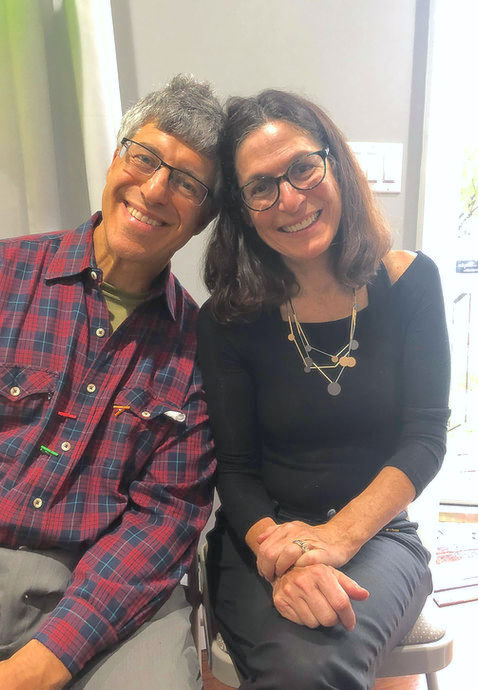Rabbi Jeffrey and his wife Mindy have long been committed to giving back to their community. In the midst of a global pandemic, an ugly election, and an insurrection, that commitment only intensified. They set out to travel the United States in an RV they named Seymour to listen and learn and returned with a better understanding of the distinct needs of local communities. Along the way, they made generous donations to every ACLU affiliate in the U.S., including New Mexico. We spoke with them to learn more about what led them on this journey.
The Torch: For some time now, the two of you have been involved in philanthropy and humanitarian work. Can you talk a little bit about how you started on this path?
Rabbi Jeffrey: Of course, it started with our parents and our role models when we were children. We’re the disciples of some real community heroes. But this project started when a simple idea hit me kind of like a freight train. It was in the middle of the pandemic and, you know, there was horrible division, and there was so much pain. And this idea just came, and it was, things that happen far away, affect us locally.
I heard something on NPR from a guy that owned a restaurant. He said, “it’s been a really bad year for us. But we’re not looking for a tax break. We’re not looking for a donation. All we want is customers.”
I thought that was pretty deep. I thought, rather than be a donor, how can I be a customer of the things that I really liked, not just restaurants, but things that I think are important for America.
Mindy: So, in January, to connect and reach out to places that are far away from where we were, we took an RV across the country, and we made our stops match up with ACLU, affiliates and United Way branches.
They say “love the stranger”, but they don’t say where the stranger lives.
Rabbi Jeffrey: We went back to the southern tip of Texas and the Mexico border to meet with the people that run the homeless shelters, the Boys and Girls Club, Salvation Army, and crisis centers and soup kitchens that serve thousands of immigrants. And we asked them, “what are some words you’d use to describe immigrants?” They were very different words than what we had heard over and over again in the news.
The Torch: What are the values that encourage you both to do this work?
Rabbi Jeffrey: They say “love the stranger”, but they don’t say where the stranger lives. There’s nothing that’s repeated more in the books of the bible, we call Torah, than, “love the stranger.” Welcome the stranger into your home. 38 times. It’s as though that’s the biggest and most important thing in all of the Bible.
Mindy: So, one of the central prayers of Judaism is the Shema, which means “listen.” And in the paragraph that comes after it starts with the word “love.” And so in order to love you have to hear first. In order to love something, you need to know it. So, we went out, to know, to learn to see, to expand our circles of awareness.
The Torch: What specifically is it about the ACLU’s mission that encouraged you to give to our organization?
Rabbi Jeffrey: We started donating to every single United Way. We gave to thousands of libraries in the United States and joined many synagogues.
And it was my son that said, if you’re going to give to United Way, you should also give to the ACLU. So, we set out to do that, to include you guys as well. We were already members and we wanted to support people who are doing great stuff, like the ACLU.
When we sent our donations, we included a note saying something like “what you’re doing is really heroic and we want to partner with you.” When affiliates responded to our note, we gave them an even larger donation.
Your clients are people that need to have their voices heard and whose rights are trampled on. People that don’t have anyone else to stand up for them be on their behalf. But the other part of your clients are the people who want to give.
You are doing miraculous things for the people whose name is on the bottom of that check. They are your clientele every bit as much as the others. You are helping them to be the people that they are intended to be.
If some of these incredible stories got out, of people helping others, and if people were to put themselves in other people’s shoes, I think America would be a much better country.
The Torch: Rather than just giving to the national ACLU, you also donated to local affiliates. Can you talk about your decision to do so and what it means to give at the local level?
Rabbi Jeffrey: When you give locally, amazing things happen.
I have this idea that almost guarantees will make your day a better day. You pick a place in the United States you’ve never been to and call up the people who are doing the work and you say, “Hi, I’ve never been to where you’re at, and I might never get there. But what you’re doing is really important to me.” You learn about what they’re working on, and you make a donation to help them do better.
I can’t think of anything that better bridges the divides in our country. It’s as easy as that.
The Torch: You actually came to New Mexico as part of a larger listening tour you did across the country. What was your experience in New Mexico like?
Mindy: Yes, we did. Well, it was lovely but cold! We were in Albuquerque in January, with a wind freezing snowstorm. Then we visited Santa Fe. It was right after the insurrection and the Capital was boarded up. There were police everywhere. It was an interesting time to be there.
The Torch: Anything else you want to share?
Rabbi Jeffrey: I think there’s a lot more caring in America than people realize. I think that people who are downtrodden are so ostracized, there’s so much fear. And people that just don’t care to look, and don’t care to listen. It’s detrimental to America. If some of these incredible stories got out, of people helping others, and if people were to put themselves in other people’s shoes, I think America would be a much better country.
Date
Wednesday, October 20, 2021 - 11:45amFeatured image

Rabbi Jeffrey and Mindy.

